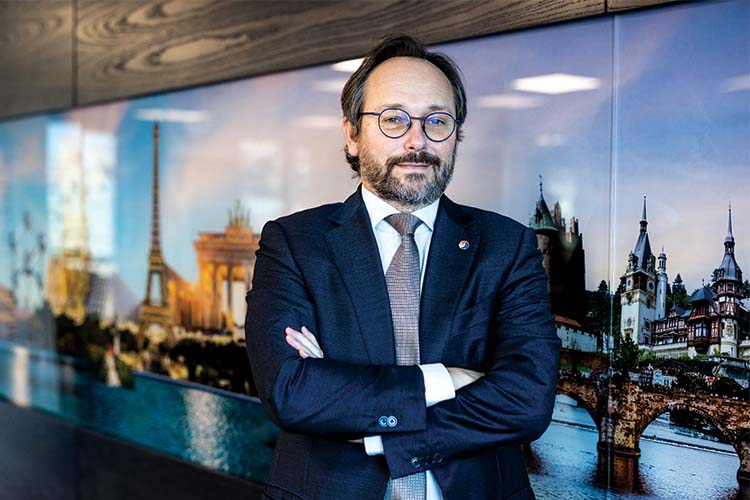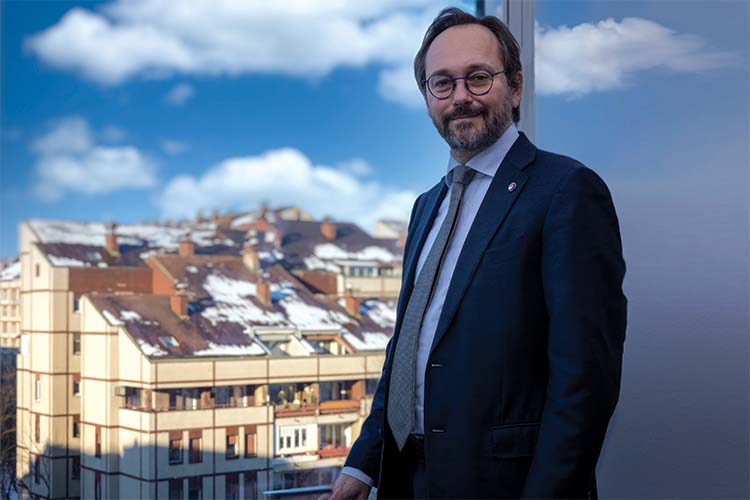The more reliable a country’s court system is, and the more corruption is being curbed and organised crime tackled, the more willing one is to invest in a country that feels like an investment in a safe place
The EU enlargement process and perspective has been, and remains, the key driver of economic and societal prosperity in Serbia, says EU Delegation to Serbia Head Emanuele Giaufret, who we interviewed for this year’s special FIC Guide. According to our interlocutor, support for Serbia’s future in the EU remains unequivocal and is visible through the delegation’s daily efforts aimed at supporting the country’s reform agenda and improving the lives of Serbian citizens.
“I would like to highlight some of the reforms that we feel are key to instilling that sense of stability, transparency and predictability. We have, for example, seen and felt how important it is to have well-functioning and well-managed state-owned enterprises. The multiplier effect they can have on the economy as a whole is enormous, both in positive or negative terms. In that regard, we very much look forward to the adoption of the new Law on the Management of State-Owned Enterprises and applaud the commitment of the government to tackle this difficult issue.
According to Giaufret, this applies in particular to the reform of electric utility power company EPS. In particular, says the EU delegation head, companies like EPS that operate in Serbia’s energy sector need to focus on corporate restructuring, the professionalisation of their respective management structures and the modernisation of business processes, in order to ensure stable energy production systems over the long term.
In parallel, the EU is working together with Serbia to diversify energy supply sources, specifically in finding replacements for fossil fuels from Russia, accelerating the implementation of green energy technologies and reducing demand for energy. “The energy sector is in our focus due to its obvious impact on the economy under the current circumstances. However, reforming the energy sector is, of course, also key when it comes to meeting the goals of the Green Agenda for the Western Balkans,” explains our interlocutor.
“We also welcomed the National Assembly’s recent adoption of the Law repealing the law on special procedures for linear infrastructure projects. This was a long-standing Commission recommendation and a point that had been raised on various occasions. This issue was also being monitored closely by EU Member States. The repeal of this law is an important step in negotiations of Chapter 5 – Public procurement. A well-functioning and transparent public procurement system can be a catalyst for local economic development. And if it does not work right, it can also be a catalyst for the misuse of public funds, corruption and abuses of power – in any country, not only Serbia.”

Thus, says Giaufret, in alignment with the good European spirit, his delegation encourages the Serbian authorities to continue working to ensure that the principles of equal treatment, non-discrimination, transparency and competition are safeguarded in all public procurement procedures.
“In the same spirit, we continue to urge Serbia to ensure the respect of the principles of public procurement, competition and transparency, particularly in intergovernmental agreements with third countries, and to refrain from the application of special laws, in line with national legislation and the EU acquis.
“In the same spirit, we look forward to amendments to Law on Planning and Construction. The main goals of these amendments include increasing the efficiency and transparency of permitting procedures for the construction sector, aligning with the EU acquis and introducing elements of the Green Agenda. So, another milestone in applying good EU practices.”
Concluding his introduction, Giaufret says that the bottom line is that everything is, and of course remains, linked to the Rule of Law in general.
Despite the EU integration process progressing slower than expected, particularly on the Serbian side, there seems to be acceleration in aligning the Western Balkans with the EU in terms of infrastructure, digitalisation, energy and green economy. How would you assess the pace and efficiency of these processes?
The EU is fully committed to support all Western Balkan partners in delivering the necessary reforms for the benefit of all citizens, and we’ve stepped up our support to develop Serbia’s infrastructure.
The Economic and Investment Plan, as well as the upcoming Growth Plan, are proof of massive commitments and investments that materialise in the form of concrete projects across the region. The Economic and Investment Plan identifies 10 investment flagships and allocates a substantial financial package of up to €9 billion in EU funds, with a potential to mobilise up to €20 billion of additional investments through the Western Balkan Guarantee Facility. So, these two figures add up to almost 30 billion euros of EU investments. This encompasses the span of time from 2021 to 2027.
EU companies have brought efficiency, modern technologies and knowhow to the Serbian economy, providing jobs for many Serbian people. They have been a booster for the economy and EU integration reforms
The Plan supports investments in sustainable transport, clean energy, environment and climate, the digital future, business sector competitiveness and the development of human capital. And maybe I will name just some of the many important projects in Serbia: we finance, for instance, the new gas interconnector with Bulgaria, in order to secure the energy supply and foster the unbundling of the gas market so that Serbia is less dependent on Russian fossil fuels. We are helping on the construction of the new railway between Belgrade and Niš, while we are also financing the construction of the Tiršova 2 paediatric hospital in Belgrade. The Economic and Investment Plan is precisely there to help accelerate things and is already delivering results.
The single market has been a powerful engine for creating wealth and prosperity among EU member states, while it also has the potential to serve as an engine for economic transformation in the Western Balkans. From the perspective of integrating the Western Balkans into the EU market, which characteristics of Western Balkan integration processes do you consider as being the most promising?
Simply put, we want to offer the Western Balkans some of the advantages of membership in advance. This means that certain requirements of membership also have to be met in advance, in particular the EU acquis will need to be enforced in relevant areas. This is one of the key objectives of the growth plan.
For all countries that have joined the EU over the last two decades, access to the Single Market has been the main driver of economic growth. Countries on the path to EU entry should also benefit from our Single Market and therewith an area that has great potential.

For example, the Western Balkans could join the EU Digital Single Market in areas such as e-commerce or cybersecurity. We have already seen positive developments in the area of telecommunications, with the reduction of roaming charges within the Western Balkans and, later this year, between the region and the European Union. We could facilitate our trade in goods and payments. For example, work is ongoing to deepen existing customs cooperation.
With many European companies re-evaluating nearshoring possibilities, attracting foreign investments becomes a sensitive process involving both political and economic considerations. How do you view Serbia’s position in attracting these foreign investments?
Serbia has proven very resilient to crises, with impressive levels of foreign direct investments registered over previous years. FDI statistics for 2022 confirmed all-time-high FDI inflows to Serbia of 4.4 billion euros, which increased by as much as 14% compared to previous record-breaking FDI inflows registered in 2021. These are impressive numbers. And EU companies have a large stake in this.
Looking at longer timeframes, EU companies are Serbia’s biggest foreign investors by far, accounting for around 60% of total FDI accumulated in the 2010-2022 period. This translates into more than €20.5 billion worth of investments coming from the EU over the previous 13 years. EU-headquartered companies have established their businesses in Serbia and have become an integral part of Serbia’s economy, with a very strong presence in the most relevant sectors of Serbia’s economy, including the auto and auto parts industry, electrical machines and apparatus, rubber and chemicals production, banking, retail, pharmaceuticals etc.
The EU Delegation consistently works with the Foreign Investors Council, the Chamber of Commerce & Industry of Serbia and numerous other business associations and bilateral EU chambers of commerce in order to better understand and support the improvement of the country’s business environment
Some of these EU companies have persistently featured among Serbia’s top 15 exporters for years. German and Italian companies are among the top investors, to name two of the source countries of investments that come. EU-based companies are champions of investment and Serbia thus benefits from the jobs created through these investments. The closer Serbia gets to the EU, the more attractive it will be for foreign direct investments. A big and prosperous market will be easier to reach.
Many European businesses, including those gathered around the Foreign Investors Council, are bringing their expertise and experience to the Serbian market. How do you, as an EU Delegation, coordinate your efforts to help Serbia improve the business climate with investors from the EU?
The EU Delegation consistently works with the Foreign Investors Council, the Chamber of Commerce & Industry of Serbia and numerous other business associations and bilateral EU chambers of commerce in order to better understand and support the improvement of the business environment in Serbia. They are also valuable contributors to our Annual Report that provides a detailed assessment of Serbia’s state of play in the EU integration process. We also have a dedicated project on the business climate that we finance, which is meant to bring improvements at a practical level.
Overall, EU companies have brought efficiency, modern technologies and knowhow to the Serbian economy, providing jobs for many Serbian people. EU companies have also brought a new corporate culture and EU values to Serbia’s economy, changing the way the country’s economy operates, with an impact on all companies operating along their respective supply and value chains, but also with an impact on individuals and society as a whole. This has, in turn, significantly increased the productivity and competitiveness of the Serbian economy, boosting its export potential, increasing budget revenues and generating economic growth. Ultimately, the opening up of the Serbian market to companies from the EU has generated a variety of choice and lower prices for Serbian consumers.
On the other hand, in Serbia we are also tasked with preparing economic operators, particularly SMEs, to be able to compete on the EU single market. Our task is to work towards Serbia’s accession to the EU – when Serbian companies will become EU companies.
| RESILIENCE Serbia has proven very resilient to crises, with impressive levels of foreign direct investment registered over previous years | ATTRACTIVENESS The closer Serbia gets to the EU, the more attractive it will be for FDI. A big and prosperous market will be easier to reach | ASSISTANCE The EU will continue working with the IMF and other stakeholders in providing assistance to Serbia and its companies to overcome challenges in the energy sector |
|---|